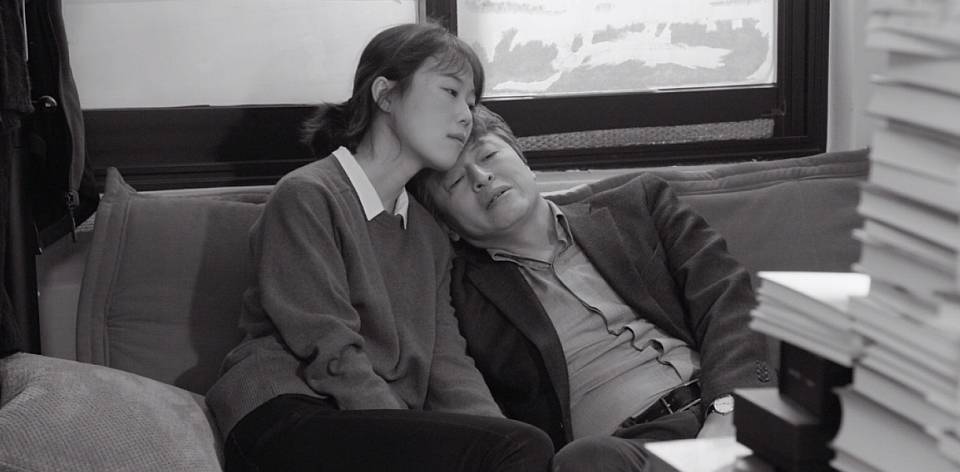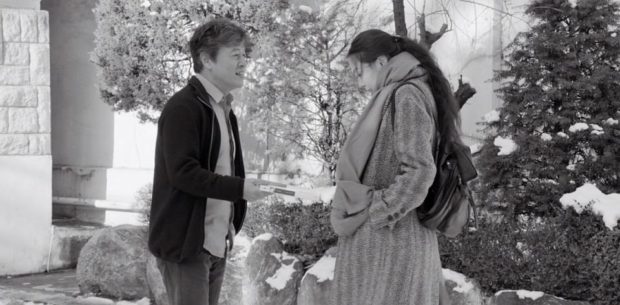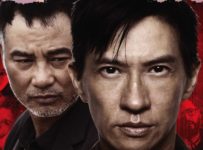Hong Sang-soo continues to play out his remorse and regrets with THE DAY AFTER (그 후), a thematic thread that has dominated his other 2017 releases, Claire’s Camera and On the Beach at Night Alone. The fallout from his well-publicised affair with actress Kim Min-hee continues to occupy his mind, and here he once again turns the accusatory gaze back on himself.
Like many of Hong’s films, the story is applied with a light brush. Ah-reum (Kim Min-hee) is an aspiring writer on her first day of work at a small publishing house run by the critic Bong-wan (Kwon Hae-hyo). Unbeknownst to her, she is replacing Chang-sook (Kim Sae-byeok), Bong-wan’s mistress. She finds out when Bong-wan’s wife (Cho Yun-hee) turns up and starts beating Ah-reum, who is mistaken for Bong-wan’s lover.
On the surface, THE DAY AFTER is textbook Hong Sang-soo. It is a another series of conversations, often set over food or drink, about trivialities or ordinary chit-chat. Yet even if you have a passing familiarity with Hong’s work, you’ll know there is a lot more lurking under the surface. Kim Min-hee is once again playing a woman who has to deal directly with the impact of a man’s infidelities. Unlike her forthrightness in On the Beach at Night Alone, here she is the victim of circumstance and scapegoated out of the office. That said, Hong instills her with a spiritual side, a level of self-awareness that accepts her fate as part of a grand design.
Continuing his public penance, Hong once again turns the gaze back on himself. In On the Beach at Night Alone, he built up to Kim Min-hee’s accusatory monologue. In THE DAY AFTER, it’s his wife that gets a similar speech (“Why are you doing this to me?”). Indeed, Cho Yun-hee beating Kim Min-hee is a kind of cinematic therapy session. “I keep thinking it’s like an exorcism,” comments Hong’s proxy in actor Kwon Hae-hyo.
So like any expunging ceremony, Hong once again uses repetition with a religious fervour. For example, he opens and closes with scenes in which Bong-wan’s wife, and alternatively Ah-reum, accusingly comment on his looks. There is a mirror quality to these scenes as well, with identical framing and mise en scène at key intervals. Indeed it’s like a reverse image of The Day He Arrives, except instead of constant reminders of the past, Ah-reum is virtually forgotten by Bong-wan.
Although we can’t always say what is going on inside the mind of the filmmaker, THE DAY AFTER is an amusingly self-aware capsule. Conversations about ‘informal’ versus ‘formal’ speech would indicate a comedy of manners, while Hong simultaneously mocks the unabashed love that he espoused in On the Beach at Night Alone. Bong-wan makes up his mind to “live for his daughter,” much as Hong has said elsewhere, although the director’s 2017 output would indicate that he may not be done with his guilt just yet.
[stextbox id=”grey” bgcolor=”F2F2F2″ mleft=”5″ mright=”5″ image=”null”] | 2017 | Korea | DIR: Hong Sang-soo | WRITER: Hong Sang-soo | CAST: Kwon Hae-hyo, Kim Min-hee, Kim Sae-byeok, Cho Yun-hee | RUNNING TIME: 91 minutes | DISTRIBUTOR: KOFFIA (AUS) | RELEASE DATE: 21 August 2017 (KOFFIA)[/stextbox]
| 2017 | Korea | DIR: Hong Sang-soo | WRITER: Hong Sang-soo | CAST: Kwon Hae-hyo, Kim Min-hee, Kim Sae-byeok, Cho Yun-hee | RUNNING TIME: 91 minutes | DISTRIBUTOR: KOFFIA (AUS) | RELEASE DATE: 21 August 2017 (KOFFIA)[/stextbox]






